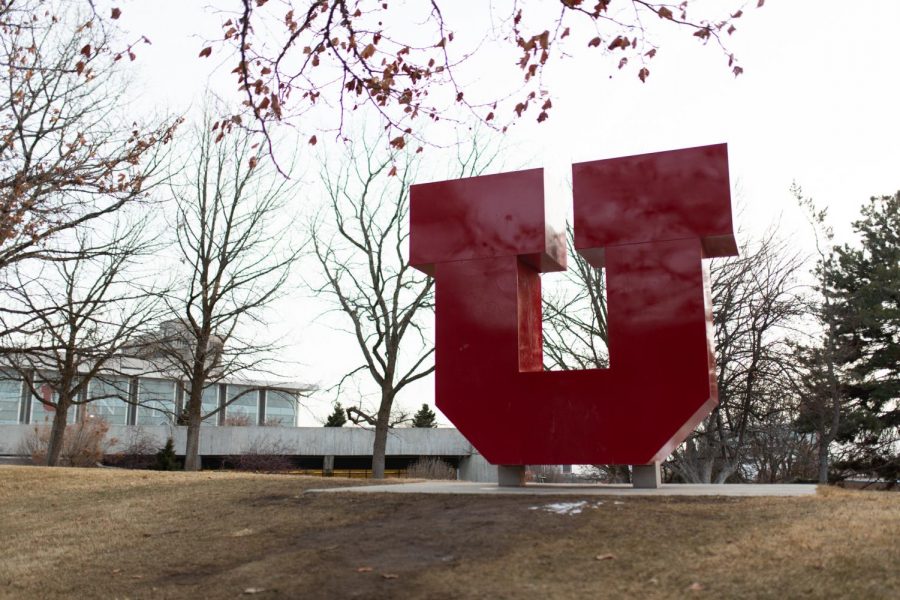Mendenhall: Let’s Break the Stigma Around Educational Breaks
Evening on University of Utah campus, Thursday in Salt Lake City. (Photo by Maya Fraser | The Daily Utah Chronicle)
April 13, 2023
Individuals pursuing any form of higher education can find their experiences extremely rewarding while others experience detrimental side effects. Attending college or a university can quickly become costly, time-consuming and mentally draining, which leads to burnout. Although daunting, students think college is worth it — otherwise we wouldn’t have the enrollment numbers we do.
But when enrolled in an intense curriculum, we must recognize the need for time off to recharge and reflect. This can be a big decision that brings negative criticism. The unwarranted stigma surrounding taking a leave of absence or gap year shouldn’t exist, especially in the academic world. We must open the dialogue and prioritize our own wellbeing to eliminate the stigma surrounding students taking time off, as it is more harmful than the burnout students experience.
Time Off? What’s That?
Whether in the form of taking a gap year or a leave of absence, it’s important to know that you can take a break at any point in your educational journey — before you begin college, during it and even right before you graduate.
Students who have taken or considered taking a leave of absence do so in light of changes brought to campuses by the pandemic. In the fall of 2020, many students were unsure what to expect with their learning experiences going forward. Some did not want to endure a strictly online curriculum, while others wanted to defer and explore other options.
Aside from gap semesters, school breaks and holidays are usually the only times that students can travel. However, many students can’t take vacations during this time for reasons such as financial difficulties. In a survey of students that anticipated taking a vacation over spring break, about 30% stated that they would use student loan money to finance their trip. In addition to not being able to afford travel, students might be concerned about losing progress, scholarships and academic momentum.
Pros and Cons
When considering enrollment for future semesters, it might seem like a no-brainer to sacrifice your social life. Taking classes over the summer can help you catch up, which can lead to a faster graduation. Other benefits include a shorter overall semester, smaller class sizes that optimize 1-on-1 learning and more campus housing options.
Many general education requirements are offered during the summer at the University of Utah. Combine this with a summer semester that runs from mid-May to August, and it could just make sense to continue with your degree in hopes of saving time later. By not taking classes over the summer, students burn out less, explore internship offers and have the opportunity to work and save more overall.
But by committing to attend school and complete coursework year-round, students have a much higher risk of burning out sooner. Academic burnout leads to mass amounts of stress and anxiety, and is often accompanied by feeling overwhelmed.
Putting pressure on students to stay enrolled in school year-round leaves them unable to take any kind of break and only accumulates the buildup of burnout. With this in mind, is it worth it to let aspects of your life suffer by struggling with burnout?
Banish the Stigma
There’s always been a negative connotation with taking time away from school — it’s not talked about in a positive light due to the potential setback of “lost earning potential.” In 2020, the conversation around time off started to shift after nearly everything moved online. However, where colleges could once predict the number of students anticipating a leave of absence, the pandemic refreshed the mindset of many, prompting more students to take time off. Although the stigma is slightly lessening, more needs to be done.
The reason there’s so much stigma surrounding gap years and breaks is due to colleges and universities pushing a toxic “grind culture” mindset. Grind culture is the attitude that students should continuously be adding more academic rigor and extracurriculars to their schedule. While sometimes helpful in identifying a student’s limits, too-high expectations are set and further contribute to burnout and feelings of failure.
Colleges need to acknowledge that by pushing grind culture, their students will only continue to burn out. To address this issue, campuses should offer more support and decrease negative connotations with time off.
It’s OK to feel overwhelmed with school and other obligations, and it’s also OK to want to take a break from feeling in over your head. There’s plenty of change that can come from taking just a single summer or semester off. Some spend their time off healing, both physically and mentally, which makes sense with how taxing school can be sometimes.
I never took a gap year, no matter how badly I wanted to between high school and college. So now, I desperately look forward to having my summers off, as it gives me a much-needed detox from anything academic. I might graduate a semester later now, but I’m willing to make that happen because it’s worth more to me than repeatedly sacrificing my mental health at the hands of burnout.
Colleges and universities at large need to understand that a four-year college plan is not one-size-fits-all. College students shouldn’t be forced to choose between burning out or negative backlash, which is why time off should be more encouraged.








